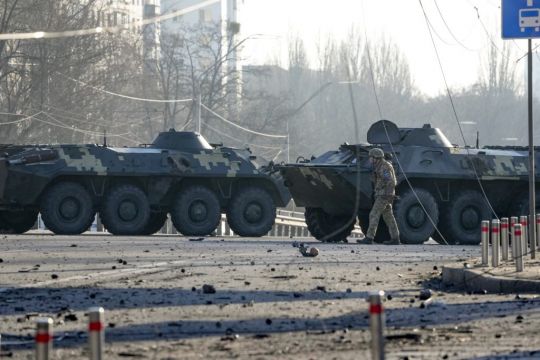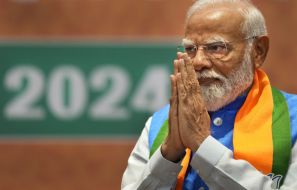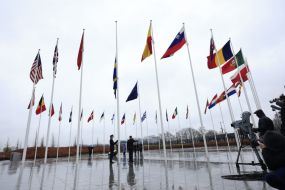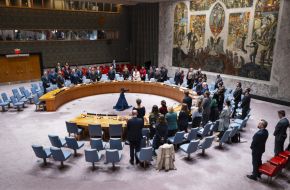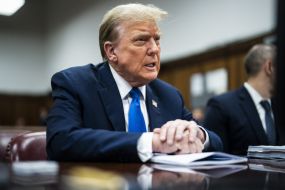After a barrage of air strikes on cities and military bases around the country, Russian forces were closing in on Ukraine’s capital on Saturday.
City officials warned of street fighting and urged residents to stay inside and take cover.
Here are the things to know about the Russian invasion of Ukraine and the security crisis in eastern Europe:
– Where is Ukraine’s president?
Volodymyr Zelensky, Ukraine’s president, has been posting video messages of himself and other national leaders in Kyiv since the invasion began on Thursday but his exact whereabouts were not publicly known.
Mr Zelensky was urged early on Saturday to evacuate Kyiv at the behest of the US government but turned down the offer, according to a senior American intelligence official with direct knowledge of the conversation. The official quoted the president as saying “the fight is here” and that he needed anti-tank ammunition but “not a ride”.
In his latest message on Saturday, Mr Zelensky said Russian attempts to forge into Kyiv have been repelled and Moscow’s plan to quickly seize the capital and install a puppet government has been thwarted.
“The real fighting for Kyiv is ongoing,” Mr Zelensky said, accusing Russia in a video message of hitting infrastructure and civilian targets. “We will win.”
Since then, Mr Zelensky has posted regular updates on his Twitter account about the various world leaders he has spoken with on Saturday, including Turkish President Recep Tayyip Erdogan and Indian Prime Minister Narendra Modi.

– What is going on in the Ukrainian capital?
Central Kyiv appeared quiet on Saturday evening, though sporadic gunfire could be heard.
Ukrainian officials reported some success in fending off Russian assaults, but fighting persisted near the capital. Skirmishes reported on the edge of the city suggested that small Russian units were trying to clear a path for the main forces.
Britain and the US said the bulk of Russian forces were 19 miles from the centre of the city.
Kyiv mayor Vitali Klitschko extended the city’s curfew from 5pm on Saturday until 8am on Monday to keep people indoors on Sunday. He said “all civilians on the street during the curfew will be considered members of the enemy’s sabotage and reconnaissance groups”.
– Russian troops march on in Ukraine
Kyiv officials are warning residents that street fighting is under way against Russian forces, who were trying to advance on the city from several directions. They advised residents to remain in shelters or if home to avoid going near windows or on to balconies.
The Ukrainian military said a battle was under way near a military unit to the west of the city centre. Kyiv mayor Vitali Klitschko said new explosions shook the area near a major power plant that the Russians were trying to attack.
A missile hit a high-rise building on the south-western outskirts of Kyiv, Mr Klitschko said on Saturday. He said rescue workers were heading there and posted an image on a messaging app, showing a gaping hole on one side of the building.

Russian Defence Ministry spokesman Major General Igor Konashenkov claimed on Saturday that since the start of Russia’s attack, its military had hit 821 Ukrainian military facilities, 87 tanks and other targets.
Maj Gen Konashenkov did not say how many Ukrainian troops were killed and did not mention any casualties on the Russian side. Neither his claims nor Ukraine’s allegations that its forces killed thousands of Russian troops could be independently verified.
Maj Gen Konashenkov claimed that the Russian military has taken full control of the southern city of Melitopol, about 35km inland from the Azov Sea coast, and said Russia-backed separatists have made significant gains in the eastern region of Donbas.
Der russische Überfall markiert eine Zeitenwende. Es ist unsere Pflicht, die Ukraine nach Kräften zu unterstützen bei der Verteidigung gegen die Invasionsarmee von #Putin. Deshalb liefern wir 1000 Panzerabwehrwaffen und 500 Stinger-Raketen an unsere Freunde in der #Ukraine.
— Bundeskanzler Olaf Scholz (@Bundeskanzler) February 26, 2022
– Allies step up to aid Ukraine
International allies have put Russia under increasing pressure and pledged additional aid to help Ukraine in the coming days.
In a significant shift, Germany announced it would send 1,000 anti-tank weapons and 500 “Stinger” surface-to-air missiles to Ukraine “as quickly as possible”. Those weapons are in addition to the 400 German-made anti-tank weapons Germany also approved to be shipped from the Netherlands, as well as 9 D-30 howitzers and ammunition from Estonia.
The Biden administration said it was sending Ukraine up to 350 million dollars (£261 million) in arms and other defensive supplies from US stockpiles, with another 250 million dollars (£186 million) in defensive support possible. The Czech Republic also approved a plan to send more arms to Ukraine.
In addition, various European countries – including the Czech Republic, Slovenia and the Baltic nations of Estonia, Latvia and Lithuania – have decided to close their airspace to Russian airlines.
– Ukrainian civilians in harm’s way
Russia claims its assault on Ukraine is aimed only at military targets, but civilians have been killed and injured during Europe’s largest ground war since the Second World War.
Ukrainian Health Minister Viktor Lyashko said on Saturday that 198 people have been killed and more than 1,000 others have been wounded in the Russian offensive. It was not clear whether the figure in his statement included both military and civilians.
He said a further 1,115 people, including 33 children, were wounded in the Russian invasion.

– Some Ukrainians are fleeing for safety
UN officials said nearly 120,000 Ukrainians had left the country for Poland, Moldova and other neighbouring nations and the number was going up fast as Ukrainians grabbed their belongings and rushed to escape the deadly Russian onslaught.
Miles-long lines of vehicles clogged border crossings, mostly carrying women, children and the elderly. Others came on trains or buses into Poland, Slovakia, Hungary, Romania and Moldova.
Authorities in these countries mobilised to receive the Ukrainians, providing shelter, food and legal help. They also eased their usual border procedures, including Covid-19 testing requirements.
“Almost 116,000 have crossed international borders as of right now. This may go up, it’s changing every minute,” said Shabia Mantoo, the spokeswoman of the UN High Commissioner for Refugees. “It’s very fluid and changing by the hour.”
The agency expects up to four million Ukrainians could flee if the situation deteriorates.
Today, I met with fellow leaders from our NATO Allies and spoke with President Zelenskyy of Ukraine. The United States continues to provide economic, humanitarian, and security support–and we continue to rally other countries to provide similar assistance. https://t.co/sVZuaJiLE5
— President Biden (@POTUS) February 25, 2022
– Turning the sanctions screws on Russia
The West has taken a military option in Ukraine off the table, but world leaders – with the exception of Moscow ally China – are preparing measures aimed at hurting the Russian economy and its leaders, including Russian President Vladimir Putin himself.
The United States, Canada and European allies all announced they are adding direct measures against Mr Putin and his foreign minister, Sergei Lavrov. EU ministers have said even further sanctions were still possible, including booting Russia out of Swift, the dominant system for global financial transactions.
Russia on Saturday warned it could react by opting out of its last remaining nuclear arms pact and cutting diplomatic ties.
The deputy head of Russia’s Security Council, Dmitry Medvedev, said sanctions could offer Moscow a pretext for a review of its ties with the West, suggesting that Russia could cut them altogether.
“We may look at each other in binoculars and gunsights,” he said.
He also suggested that Russia could opt out of the New START nuclear arms control treaty that limits US and Russian nuclear arsenals.
Asian and Pacific countries have joined the West in taking punitive measures against Russia, including export controls aimed at starving its industries and military of semiconductors and other high-tech products.
– Sporting world turns its back on Russia
The 2021/22 #UCLfinal will move from Saint Petersburg to Stade de France in Saint-Denis.
The game will be played as initially scheduled on Saturday 28 May at 21:00 CET.
Full statement ⬇️— UEFA Champions League (@ChampionsLeague) February 25, 2022
Poland is refusing to play its World Cup qualifier against Russia next month in response to Russia’s invasion of Ukraine, the Polish football federation president said on Saturday. The match had been scheduled for March 24.
Later on Saturday, Sweden joined Poland in declaring that its national football team would not play a match against Russia regardless of where it takes place.
In addition, Russia has been stripped of hosting the May 28 Champions League final by Uefa with St Petersburg replaced by Paris, and Formula One dropped this season’s Russian Grand Prix in Sochi in September.
The International Ski Federation announced Russia will not host any more of its World Cup events this winter, and the European curling championships scheduled to be held in November in Perm, Russia, will also be relocated.
The International Tennis Federation also cancelled all events taking place in Russia indefinitely.
